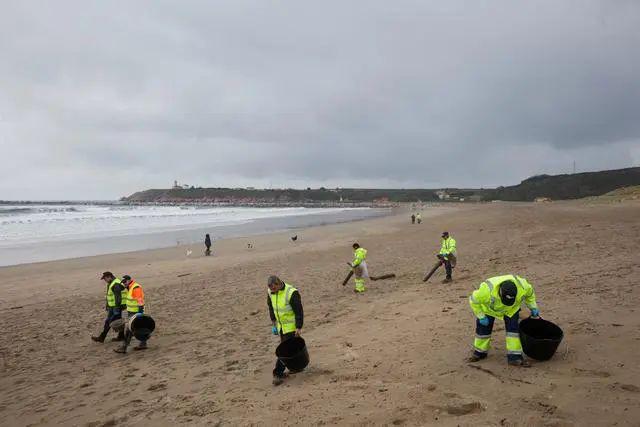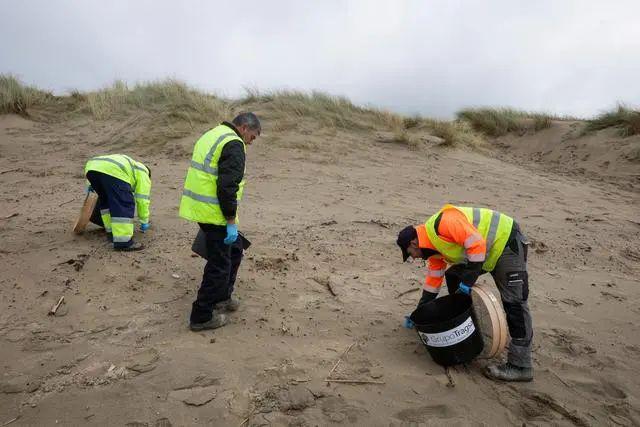2024.01.12
An environmental emergency has been declared in two parts of Spain after a large number of plastic particles washed ashore
Page view:1928
On January 11, there was a sleepless news, a large number of plastic particles have been washed up on the coast of northern Spain, and two areas near its "landing point" have been declared an environmental emergency (level 2 alert). The local government said it had organized manpower to clean up the plastic "pollutant."

Local volunteers and professionals work together to clean up plastic particles at a beach in Asturias, Spain, Jan. 10, 2019. Xinhua/Reuters
Accidents happen, they fight each other
The governments of Galicia and neighboring Asturias declared a state of environmental emergency on Jan. 9, asking the central government to help clean up the "pollutants," which are the size of individual soybeans, AP reported.
According to Reuters, the plastic particles came from a container that fell into the sea from a cargo ship in December 2023. The Liberian-registered ship, chartered by Denmark's Maersk Line, was on its way from the port of Algeciras in southern Spain to the Dutch port of Rotterdam on December 8 when six containers, one of which contained 25 tonnes of plastic pellets, fell into the sea. Just a week later, a bead appeared on a Galician beach. Powerful ocean currents are carrying the beads farther and farther north. Beads are used to make plastic parts. Environmental groups have estimated that millions of plastic particles were thrown into the sea.
Asturias declared a level two alert ahead of Galicia, which allows the central government to provide aid to it.
Plastic bead pollution has also sparked political controversy in Spain, the Berliner Morning Post reported. Environmental groups plan to file environmental crime charges against shipping companies; Galicia's conservative regional government complained that Madrid had not informed them in a timely and detailed manner, and Madrid government representatives countered that the regional coast guard had been informed of the incident well before Christmas; The opposition filed a lawsuit against the Galician regional government for its inaction.
The freighter was reportedly registered in Liberia. The company responsible, Maersk Line, denied all responsibility, saying the freighter did not belong to them and had been chartered. Bedeko, a Polish plastics manufacturer whose name was printed on the bags, said the shipment belonged to an Indian company. The Spanish prosecutor's office is currently investigating whether shipping companies or microplastics manufacturers are liable. But initial investigations suggest it will be difficult to find those responsible. As a result, taxpayers are likely to have to foot the bill again for coastal cleanup.
Millions of plastic beads pose a threat to humans and Marine animals
Large quantities of plastic particles have been found along the northern coast of Spain since at least December 13, 2023. Volunteers and professionals work together to clean up, using tools to painstakingly pick out plastic particles mixed in with the sand. "It's almost impossible to clean the beach completely." "Said an environmental activist squatting on a Galician beach to clean up rubbish.

A Spanish environmental group called the plastic particles a threat to the environment, "because fish eat them as eggs and enter the food chain... It ends up on our table."
However, Maersk Line said in a statement that there were no dangerous items in the six containers that fell into the sea, and that the plastic particles were PET, which is not biodegradable and is used "in the manufacture of food-grade packaging, such as drinking water bottles."
Teresa Rivera, Spain's Minister for Ecological Transformation, said: "The pollution of oceans and ecosystems by plastics is a major problem for humanity. "With such a large amount of plastic ending up in the sea, there needs to be a close investigation of transport companies and shipping companies to see if they are taking proper precautions."
Marine plastic pollution control is urgent
Galicia is not an isolated case. According to Marine conservation organization Surfrider, the plastics industry and its suppliers lose up to 160,000 tons of plastic particles every year in Europe alone. This happens not only during sea transport, but also in road, rail and peri-factory transport.
Marine ecosystem is the most important ecosystem in the world, affecting the stability and security of the global ecosystem. But in recent years, Marine waste pollution has become increasingly serious, the amount of plastic entering the aquatic ecosystem every year is about 18 to 28 million tons, and the United Nations Secretary-General Guterres said at the "Ocean Conference" that by 2050 the total weight of plastic waste in the ocean may exceed that of fish. At present, Marine plastic waste and microplastic pollution has become one of the top ten environmental problems that need to be solved in the world.
Previous:Recycled plastics market obser...
Next:Research progress of waste pla...

